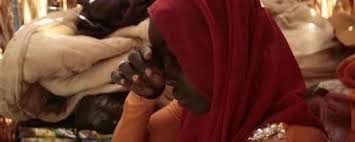It is around sunset, normally a quiet time in Tabit, a market village in North Darfur that hosts around 7,000 people. A young woman in her twenties, Mahassan, is preparing perfumes for a wedding together with three friends.
Suddenly, ten soldiers enter the compound. They start dragging the women outside into the street. Each of them is raped multiple times.
Mahassan recounts the horrible evening: “The soldiers said that they were looking for a missing soldier. They searched the compound, and then came towards us. They grabbed me and they grabbed my friend. The other soldiers took the other girls in a different direction. They took me and my friends outside of the compound towards the school.”
“They raped both of us on the street. Three of them raped me. And three of them raped my friend. They raped us all night. That’s why I’m still sick. I cannot sit down for a long time like I could before,” she says.
This is the account of a woman (Mahassan is not her real name) who was raped on 30 October 2014, according to a human rights report released by Human Rights Watch (HRW) in New York today.
At the same time another woman, Maria, in her forties, is returning from her farm outside the village, riding her donkey. She sees soldiers blocking the road.
“I refused to stop, and one cocked his gun. He said that if I didn’t stop, he would shoot me. I asked him why. He said: ‘Your men killed our guy’,” recalls Maria.
The soldiers pull Maria off the donkey, while three other soldiers join them. They start to beat her and rape her on the street. After returning home, Maria (not her real name) finds out that two of her neighbours were also raped that evening.
Um Juma, a woman in her thirties, hears screaming in the town and runs with her children to her mother’s home, hoping to find refuge. Soldiers enter the compound. They hurl one of her children against a wall, breaking his arm and leg, and rape her in front of her screaming mother.
“I fought one and hurt one. … When they saw that I wanted to fight they threatened me with their gun. Then they raped me. … There were four of them. … Two had civilian clothes. … [They raped me] in front of my mother. She was screaming.”
The second day
When the night turns to day, on Friday, women and families start to exchange stories about the rape and harassment. But the ordeal has not ended yet.
That evening Asal is at her compound with her brother when soldiers enter. “Three men came inside the hut. Two of them were holding me. The third was raping me. When I cried they pushed a piece of cloth into my mouth.”
“Then the other one raped me. And then they tied me up and left me inside the hut.”
As she lies there, Asal hears screaming coming from the village all night. Eventually her mother comes and unties her and her brother. “Then we all cried.”
Kondero is at home on Friday at 8:00 p.m. with her mother, father, and brothers. Suddenly six soldiers entered, beat her father and brother, and take them out of the compound, before raping her and her mother. “I was in the house in the morning. I was with my mother and brothers. Six soldiers entered. Three men raped me. They had guns,” she told HRW.
Meanwhile, Khatera, in her early forties, is at home with her three daughters, two of whom are under the age of 11. Soldiers burst into the house. “Immediately after they entered the room they said: ‘You killed our man. We are going to show you true hell.’ Then they started beating us. They took my husband away while beating him.”
“They raped my three daughters and me. Some of them were holding the girl down while another one was raping her. They did it one by one,” says Khatera.
“One helped beating and the other raped. Then they would go to the next girl. Two were holding the girl and one would rape.”
221 names
Altogether, the organisation HRW collected 221 names of women and girls who were allegedly raped in Tabit from October 30 to November 1, 2014. Sources included 15 female rape victims, 35 residents of Tabit, family members friend and neighbors of rape victims, as well as Sudanese groups that had conducted separate investigations.
Based on all the available evidence, HRW was able to directly document the accounts of least 27 women and girls who were raped, and has “credible information” about another 194 alleged incidents of rape, for a total list of 221 women who were reportedly raped.
Report by Hildebrand Bijleveld for Radio Dabanga




